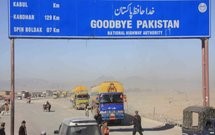 As the United States and its NATO allies put the finishing touches on their military drawdown in Afghanistan, Washington and some of its Western and Middle Eastern allies have begun a much more modest intervention against transnational jihadism in Iraq and Syria.
As the United States and its NATO allies put the finishing touches on their military drawdown in Afghanistan, Washington and some of its Western and Middle Eastern allies have begun a much more modest intervention against transnational jihadism in Iraq and Syria.
The West's military departure from southwest Asia raises fears that the Afghan-Pakistani border region could go the way of the Syrian-Iraqi frontier, especially because Kabul and Islamabad will be fighting their respective jihadis rebels for many years to come. However, the overall strategic situation in Afghanistan and Pakistan is far better than that of Syria and Iraq, and if Islamabad and Kabul cooperate, there is a good chance the cross-border Pashtun areas will not become a jihadis quasi-state as the Sunni areas in eastern Syria and western Iraq have.
The Afghan and Pakistani army chiefs reached an agreement Dec. 23 to conduct coordinated attacks in their respective territories against local and foreign jihadis of all types with no discrimination. The agreement was made at a meeting in Rawalpindi between Pakistan's chief of the army staff, Gen. Raheel Sharif, and his Afghan counterpart, Gen. Sher Muhammad Karimi. The NATO commander in Afghanistan, Gen. John Campbell, was also present. This is the third time within a week the three men have met; Sharif and Pakistan's intelligence chief flew to Kabul the day after the Dec. 16 massacre of 132 school children in Pakistan — the deadliest jihadis attack in the country's history.
Even before the attack, Islamabad had slowly begun modifying its ambiguous stance toward Islamist militants who were not fighting the Pakistani state, and the killing of the school children has only increased the momentum behind Pakistan's shift. The country's civil and military leadership is making sweeping changes to the way it fights religious extremism and terrorism. However, the critical component that has aided the insurgency is the ability of Afghan and Pakistani Taliban militants to use each other's territories as staging grounds for attacks in their respective countries.
Since the founding of the post-Taliban state in 2002, Kabul and its Western allies have had bitter relations with Islamabad. This was mainly because Pakistan allowed the Afghan Taliban to find sanctuary on its soil. However, during the past five years, as the Taliban insurgency has risen in Pakistan and Islamabad has launched a counter-insurgency campaign, the Pakistanis have become angry with the Afghans for aiding and abetting Pakistani rebels. Growing cross-border Taliban activities, the NATO drawdown and the changing of governments in both capitals have facilitated a realization within Pakistan that it cannot defeat jihadism within its borders if the original insurgency inside Afghanistan continues. This is why Pakistan and Afghanistan pledged cooperation during Afghan President Ashraf Ghani's visit to Pakistan in mid-November and why the countries' militaries have agreed to carry out coordinated military operations on both sides of the border.
Despite their respective problems, both the Afghan and Pakistani states are not nearly as weak as the Syrian and Iraqi governments, which are no longer even coherent political entities and whose citizens do not agree on a single national identity. But it will take much more than simple military operations on either side of the Durand Line to prevent the kind of chaos that has erupted on both sides of the Sykes-Picot border between Syria and Iraq.
Islamabad and Kabul will have to hand over insurgent leaders wanted by the other side. However, the most critical aspect of any bilateral cooperation will involve Pakistan telling the Afghan Taliban that they must negotiate with Kabul. The group has a nationalist jihadis orientation, as opposed to the Pakistani Taliban, which shares a transnational worldview with al Qaeda and the Islamic State. It is not clear to what extent the Pakistanis can directly force the Afghan Taliban to move toward ending their insurgency, but by actively denying Afghan Taliban fighters sanctuary, the Pakistanis can indirectly nudge them in that direction. A strengthened Kabul is the partner Islamabad needs to fight the jihadis insurgents in the cross-border Pashtun lands to keep them from turning the area into a vast battlespace like the one that has emerged in Syria and Iraq.
Courtesy : Stratfor (www.stratfor.com)